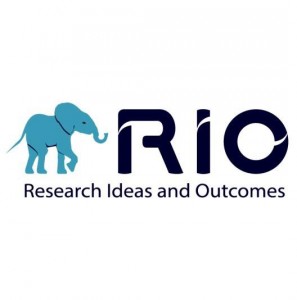Say hello to Research Ideas & Outcomes (RIO), a new open access journal, formally open for business today! The new journal represents a useful addition to traditional publishing, in that it will publish research from all stages of the research cycle, across a broad suite of disciplines, from humanities to science.

Traditionally, journals accept articles that are the final product of the research continuum, typically long after the core work has been completed. RIO will publish ideas and outputs from all stages of the research cycle: proposals, experimental designs, data, software, research articles, project reports, policy briefs, project management plans and more.
The journal takes another step ahead with a collaborative platform that allows all ideas and outputs to be labelled with Impact Categories based upon UN Millennium Development Goals (MDGs) and EU Societal Challenges. These categories provide social impact-based labelling to help funders, journalists and the wider public discover and finance relevant research as well as to foster interdisciplinary collaboration around societal challenges.
This new journal comes packed with technical innovation and unique features. The journal is published through ARPHA, the first publishing platform ever to support the full life cycle of a manuscript: from authoring to submission, public peer review, publication and dissemination, within a single, fully-integrated online collaborative environment. The new platform will also allow for RIO to offer one of the most transparent, open and public peer review processes, thus building trust in the reviewed outcomes.
These features come à la carte: RIO will offer flexible pricing where authors can choose exactly which publishing services fit their needs and budget. All its contents – including reviews and comments, data and code – will receive a persistent unique identifier, will be permanently archived and made available under open licenses without any access embargo. This is great for authors who generate a lot of digital research outputs, as they can get credit for more than just manuscripts at the end of the day.

RIO journal publishes all stages of the research cycle – ideas, methods, data, software, and final results.
“RIO is not just about different kinds of submissions, though that is a crucial feature and certainly unique for publishing ongoing or even proposed research: it is also about linking those submissions together across the research cycle, about reducing the time from submission to publication, about collaborative authoring and reviewing, about mapping to societal challenges, about technical innovation, about enabling reuse and about giving authors more choice in what features they actually want from the journal.” said Dr. Daniel Mietchen, a founding editor of RIO.
“I’m proud to pioneer the first journal which can publish research from all stages of the research process,” said Prof. Lyubomir Penev, Co-Founder of RIO and Pensoft. “For the first time, researchers can get formal publication credit for previously ‘hidden’ parts of their work like written research proposals. We can publish all outputs in one journal; the same journal – RIO.”
This is a much more welcome advance than journals such as Science Advances or Heliyon, which offer very little to progress research or aid researchers compared to other open access venues. (views of the author, which are totally unbiased..)
RIO is scheduled to start accepting manuscripts in November 2015.

binay panda
this is a good development. however, in order for any oa journal or initiative to be successful, the minds and practices of scientists must change first. as the old adage goes, “old habits die hard”, the only way is to wait till the next generation of scientists make room for themselves and the old and not-so-old ones are phased out.
the whole field of science is corrupted by the collusion between publishers and a handful of scientists who the exclusionary criteria suits to remain relevant. i personally like society journals because they are specialist journals that look into the subject more rigorously. this, of course, is a generalization but is more or less true. the problem w the society journals, however, is that they take long long time to get the article accepted and this void leaves the general readers without any immediate access to the non-peer reviewed material/data. i am not in favor of having a commercial publisher taking charge of publishing. no matter how noble the intention may be, the market pressure and greed tend to take over. in order to believe this, all one needs to do is to look at the top 3 publishing companies today. they run like any for-profit companies, period. stupid i, what am i talking about, they indeed are for-profit companies. i like the model of elife, which is run and financially supported by the same agencies that give research grants to do the work in the first place. the problem with elife is that it is biased, my opinion, towards more hard core biology papers.
if one looks at the field of science and how scientists get to the top of their respective fields, its not just good science that matters, its the whole package, how not just to do good science but also how to get more grants, how to publish in “so-called” high impact factor journals, how to get academy membership, how to get coveted prizes and so on and so forth top the “to do” list for scientists. therefore, science has become like any other career profession. therefore, let’s STOP pretending that it isn’t and be the CHANGE that we all want it to be. thank you. binay panda